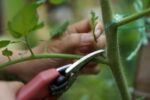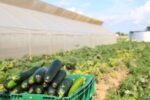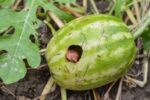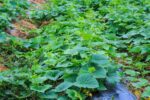Last updated on May 3, 2025
Let’s talk about feeding your watermelons! If you want to grow those big, juicy, sweet melons we all love, you simply cannot ignore the importance of proper fertilization. Getting the right nutrients to your plants at the right time is just as vital as choosing the best soil for watermelon or planting at the right time. So, what fertilizer is best for watermelons? It’s a question every successful farmer needs to answer, and getting it right can dramatically increase your yield and fruit quality.
Think of fertilizer as the food your watermelon plants need to grow strong, produce lots of flowers, and develop those heavy, sugary fruits. Without adequate nutrition, your plants will struggle, leading to smaller fruits, lower yields, and potentially more problems with pests and diseases.
Understanding the nutritional needs of watermelons and how to meet them is a key part of successful watermelon farming Nigeria. And speaking of getting things right from the start, choosing the right type of watermelon is also crucial – you can learn more about that in our guide on what are the varieties of watermelon in Nigeria. For a complete guide on the planting process itself, check out our comprehensive article on how to plant watermelon in Nigeria.



Quick Answer: What fertilizer is best for watermelons?
The best fertilizer for watermelons is a balanced approach that includes incorporating organic matter into the soil and applying fertilizers with appropriate NPK for watermelon ratios adjusted to the plant’s specific growth stage (more nitrogen early on, higher phosphorus and potassium during flowering and fruiting), ideally guided by a soil test.
Why Proper Fertilization is Crucial for Watermelon Growth
Seriously, you can’t expect a plant to perform miracles on poor soil alone! Proper fertilization provides the essential elements watermelons need throughout their life cycle.
Overview of watermelon nutritional needs
Watermelons are considered heavy feeders, meaning they require a good supply of nutrients, especially nitrogen (N), phosphorus (P), and potassium (K) – the big three, often referred to as NPK for watermelon. They also need secondary nutrients like calcium, magnesium, and sulfur, and micronutrients in smaller amounts. These nutrients play different roles:




- Nitrogen for leafy growth and vine development.
- Phosphorus for root and flower development.
- Potassium for fruit quality and overall plant health.
What Is the Best Fertilizer for Watermelon?
So, with all those nutrients needed, what is the best fertilizer for watermelon? It’s not a single answer, really. The best approach involves a combination of soil preparation and timely applications of balanced fertilizers.
Importance of balanced N-P-K ratios
A balanced fertilizer contains nitrogen, phosphorus, and potassium in specific ratios. The ideal ratio changes as the watermelon plant grows. Young plants need more nitrogen for leafy growth, while flowering and fruiting plants need more phosphorus and potassium. Using a fertilizer with the right NPK for watermelon at each stage is key.
Recommended fertilizers for different growth stages
- Before planting: Incorporate organic matter like compost or well-rotted manure. A balanced granular fertilizer (like a 10-10-10 fertilizer for watermelon) can also be worked into the soil before planting, based on your soil test recommendations. This initial step is part of how to plant watermelon in Nigeria correctly.
- Early growth (vine development): As the vines start to grow, a fertilizer slightly higher in nitrogen might be beneficial to encourage strong vegetative growth.
- Flowering and Fruiting: This is when you switch to a fertilizer lower in nitrogen and higher in phosphorus and potassium.
Which NPK Is Best for Watermelon?
This is where the specific numbers on the fertilizer bag come in! Which NPK is best for watermelon depends on the growth stage.
Optimal NPK ratios during vegetative, flowering, and fruiting stages
- Vegetative Stage (early growth, vine run): A balanced ratio like 10-10-10 fertilizer for watermelon or something slightly higher in nitrogen like 15-10-10 can work. Nitrogen fuels that initial leafy growth.
- Flowering Stage: As flowers appear, the need for phosphorus and potassium increases. A ratio like 10-15-10 or 10-20-20 is often recommended. Phosphorus helps with flower formation, and potassium is crucial for overall plant health and fruit set.
- Fruiting Stage: Once fruits start to form and grow, potassium becomes even more critical for fruit size, sweetness, and quality. A fertilizer high in potassium, like 10-10-20 or even higher potassium blends, is beneficial.
Adjusting fertilizer based on soil tests
The absolute best way to know which NPK is best for watermelon in your specific soil is to get a soil test. Seriously, this is a game-changer! A soil test report will tell you exactly what nutrients your soil is lacking and its pH level, allowing you to tailor your fertilizer applications precisely. For instance, sandy soils common in Northern Nigeria might often need more frequent nitrogen applications due to nutrients leaching away quickly, while some Southern soils, even if clayey, could have naturally higher phosphorus but require careful pH management to make that phosphorus available. Getting a soil test saves you money and prevents over-fertilization, which can harm your plants and the environment. You can learn more about testing your soil in our guide here: which type of soil is best for watermelon.




Which Fertilizer Is Best for Flowering and Fruiting?
When those yellow flowers start showing up, your fertilization strategy needs to shift! Which fertilizer is best for flowering and fruiting focuses on boosting phosphorus and potassium.
Role of phosphorus and potassium in flower and fruit development
Phosphorus (P) is like the energy currency for plants; it’s essential for converting sunlight into energy and is crucial for root development, flowering, and setting fruit. Potassium (K) is involved in moving sugars and water within the plant, which directly impacts fruit size, quality, and sweetness. It also helps the plant resist diseases.
Timing and application methods for bloom boosters
Fertilizers high in phosphorus and potassium are often called “bloom boosters” or “fruit finishers.” Apply these when you see the first flowers appear and continue applications as the fruits develop, following a recommended watermelon fertilizer schedule. You can apply granular fertilizers around the base of the plants (be careful not to touch the stems) or use liquid fertilizer for watermelon through irrigation systems like drip irrigation for direct delivery to the roots.
Can I Apply Urea to Watermelon?
Urea is a common nitrogen fertilizer, and the question often comes up: Can I apply urea to watermelon? Yes, you can, but with caution and proper technique.





Benefits and risks of using urea
- Benefits: Urea is a readily available source of nitrogen, which is essential for early vine growth and getting those plants big. It’s often relatively affordable.
- Risks: Urea is highly concentrated nitrogen. Applying too much or applying it incorrectly can burn the plant’s leaves and roots. It can also be lost to the atmosphere as a gas if not incorporated into the soil or watered in properly. Over-applying nitrogen, especially later in the season, can lead to excessive leafy growth at the expense of fruit production.
Proper application techniques to avoid plant damage
If you use urea, apply it carefully. Avoid getting the granules on the leaves or stems. It’s best to apply it around the base of the plant and immediately water it in or apply it just before rain is expected. Applying urea in split applications (smaller amounts several times) is safer than applying a large amount at once. Always follow recommended rates based on soil tests and plant needs.
What Makes Watermelon Grow Bigger?
Everyone wants to know what makes watermelon grow bigger! Several factors contribute to fruit size, and nutrition is definitely one of them.
Influence of nitrogen and other nutrients on vine and fruit size
Nitrogen is important for developing a strong, vigorous vine, which is necessary to support large fruits. However, too much nitrogen late in the season can lead to lush vines but smaller, less sweet fruits. Phosphorus and potassium are crucial for the fruit itself to develop and swell. Adequate calcium is also needed for cell wall structure, contributing to fruit firmness and size.
Importance of consistent watering and sunlight
Beyond fertilizer, consistent water is absolutely critical for fruit size. Watermelons are mostly water, after all! Irregular watering can lead to stunted growth and even cracked fruits. Plenty of sunlight (at least 6-8 hours daily) provides the energy the plant needs to convert nutrients and water into sugars and fruit mass. So, while fertilizer is key, don’t forget consistent watering and ample sun!




How to Make Watermelon Big and Sweet?
Making watermelons big and sweet is the ultimate goal! How to make watermelon big and sweet involves a combination of good nutrition and proper care.
Strategies for enhancing sugar content
Potassium is the superstar nutrient for sweetness. Ensuring adequate potassium levels, especially during the fruit development and ripening stages, helps the plant produce and transport sugars into the fruit. Avoiding over-watering as the fruit approaches maturity can also concentrate the sugars, making the melon sweeter.
Role of potassium and magnesium in sweetness
Potassium is directly involved in sugar transport. Magnesium is a component of chlorophyll, essential for photosynthesis (the process that creates sugars). Ensuring both are available helps the plant produce and store sugars effectively in the fruit.
What Makes Watermelon Sweeter While Growing?
It’s a common question: What makes watermelon sweeter while growing? It’s not just one thing, but a combination of factors working together.
 Watermelon Pest and Diseases Treatment – How Do You Treat Watermelon Disease? →
Watermelon Pest and Diseases Treatment – How Do You Treat Watermelon Disease? →

Impact of soil health and organic matter
Healthy soil, rich in organic matter, provides a steady supply of nutrients and supports beneficial soil microbes. This creates an optimal environment for the plant to take up nutrients efficiently, including those needed for sugar production. Organic fertilizer for watermelon can contribute significantly to soil health.
Avoiding over-irrigation during ripening
As the watermelon gets close to being ripe, reducing watering slightly (but not letting the plant totally dry out) can help concentrate the sugars in the fruit, making it sweeter. Over-watering just before harvest can dilute the sugars.
Watermelon Fertilizer Schedule
Having a watermelon fertilizer schedule is a smart way to ensure your plants get the nutrients they need at the right time. This is a general guide, and you should adjust it based on your soil test results and the specific fertilizer product you are using, as well as the best time to plant watermelon in your region.
Step-by-step guide from planting to harvest
Here is a general step-by-step guide:





- Before Planting: Incorporate compost or well-rotted manure into the soil. Apply a balanced granular fertilizer (like 10-10-10 fertilizer for watermelon) based on soil test recommendations.
- Once Vines Start to Run (about 3-4 weeks after planting): Apply a balanced fertilizer or one slightly higher in nitrogen around the plants.
- When First Flowers Appear: Switch to a fertilizer higher in phosphorus and potassium (like 10-15-10 or 10-20-20).
- As Fruits Begin to Swell: Continue with a fertilizer high in potassium to support fruit growth and sweetness. Repeat applications every 2-3 weeks as needed, following product instructions.
- About 2 Weeks Before Harvest: Stop fertilizing.
Frequency and quantity of fertilizer applications
The frequency and quantity depend on the fertilizer type (granular vs. liquid), the soil type, and the weather. Granular fertilizers are typically applied less often (every 3-4 weeks), while liquid fertilizers might be applied more frequently through irrigation. Always follow the instructions on the fertilizer packaging and consider split applications to avoid burning plants.
Homemade Fertilizer for Watermelon
Looking for more natural or cost-effective options? Homemade fertilizer for watermelon can be a great supplement!
DIY recipes using kitchen waste like banana peels and watermelon rinds
Here are a few ideas:
- Banana Peels: Rich in potassium! You can bury chopped banana peels near your plants or make a “banana peel tea” by soaking peels in water for a few days and using the liquid to water your plants.
- Watermelon Rinds: Contain some nutrients. While not a complete fertilizer, composting watermelon rinds and adding the finished compost to your soil is beneficial.
- Eggshells: Provide calcium. Crush dried eggshells into a powder and mix into the soil.
Benefits of compost teas and natural amendments
Compost teas (liquid made by steeping compost in water) provide a boost of nutrients and beneficial microbes. Using organic fertilizer for watermelon, like well-rotted manure or compost, improves soil structure and provides nutrients over time. These natural amendments contribute to long-term soil health watermelon.


Is Cow Manure Good for Watermelon?
Yes, is cow manure good for watermelon? Absolutely! Well-rotted cow manure for watermelon is an excellent organic fertilizer and soil amendment.
Nutrient profile of cow manure
Cow manure contains nitrogen, phosphorus, potassium, and other micronutrients. The exact nutrient content varies depending on the cow’s diet and how the manure is handled, but it’s a valuable source of organic matter and nutrients for your soil.
Composting and application methods
It is crucial to use well-rotted or composted cow manure. Fresh manure can be too high in nitrogen salts and can burn plants. Composting breaks down the manure, making the nutrients more available and killing potential pathogens and weed seeds. Work well-rotted cow manure for watermelon into the soil before planting. Avoid piling fresh manure directly onto plants.
What Fertilizer Is Best for Watermelons in Pots?
Growing watermelons in containers presents unique challenges for fertilization. What fertilizer is best for watermelons in pots needs a slightly different approach.
Challenges of container cultivation
Nutrients can leach out of pots more quickly than in the ground due to frequent watering. The plant’s root system is also confined. This means potted watermelons need more consistent, controlled feeding.
Selecting slow-release and liquid fertilizers
A good strategy for potted watermelons is to mix a slow-release fertilizer into the potting mix at the beginning of the season. This provides a steady supply of nutrients over several weeks. Supplement this with a liquid fertilizer for watermelon every few weeks, especially during flowering and fruiting. Choose a balanced liquid fertilizer and switch to one higher in phosphorus and potassium as needed.
What Fertilizer Is Best for Watermelons in Nigeria?
Considering local conditions, what fertilizer is best for watermelons in Nigeria often involves a combination of organic and inorganic options, tailored to specific soil types and regions.
Soil types and common deficiencies in Nigerian regions
Nigerian soils vary. Sandy soils in the North might be lower in organic matter and nutrients, requiring more frequent fertilization. Clay soils in the South might have nutrient-holding capacity but can have drainage issues affecting nutrient uptake. Soil tests are vital to identify specific deficiencies in your area. Understanding your soil type is key, and you can learn more about that here: which type of soil is best for watermelon.
Locally available fertilizers and organic options
Commonly available inorganic fertilizers in Nigeria include NPK blends (like 15-15-15, 20-10-10, etc.), Urea, and Single Superphosphate (SSP). Locally available organic options include poultry manure, cow manure, and compost. The best fertilizer for watermelon in Nigeria will likely involve using organic matter to improve soil health and structure, supplemented with inorganic fertilizers based on soil test recommendations and the plant’s growth stage.
What Causes Watermelons to Stop Growing?
It’s frustrating when your watermelons just stop growing! What causes watermelons to stop growing? It’s often related to nutrient issues or environmental stress.
Identifying nutrient deficiencies and environmental stressors
Here are some common reasons:
- Nutrient Deficiencies: Lack of essential nutrients, especially nitrogen, phosphorus, or potassium, will slow or stop growth. A soil test can confirm this.
- Water Stress: Too little or too much water is a major culprit. Waterlogged soil suffocates roots, while drought prevents nutrient uptake.
- Temperature Extremes: Watermelons prefer warm weather. Very cold or excessively hot temperatures can halt growth.
- Pests and Diseases: Severe infestations or infections can weaken the plant and stop fruit development.
- Poor Pollination: If flowers aren’t pollinated, fruits won’t develop beyond a tiny size.
Corrective measures to resume healthy growth
Identify the cause! If it’s a nutrient deficiency, apply the appropriate fertilizer. If it’s water stress, adjust your irrigation. Protect plants from extreme temperatures if possible. Manage pests and diseases promptly. Ensure good pollination. Addressing the underlying issue is key to getting your watermelons growing again.
Summary and Best Practices
Getting fertilization right is a key ingredient for a bountiful watermelon harvest.
Recap of key fertilization strategies
Here’s a quick recap:
- Start with healthy soil amended with organic matter.
- Get a soil test to know your soil’s specific needs.
- Use a balanced fertilizer (like 10-10-10 fertilizer for watermelon) early on.
- Switch to a fertilizer higher in phosphorus and potassium for flowering and fruiting.
- Consider liquid fertilizer for watermelon or split applications for efficient nutrient delivery.
- Don’t forget consistent watering and ample sunlight.
Tips for monitoring plant health and adjusting practices
Observe your plants regularly! Yellowing leaves might indicate nitrogen deficiency. Poor flowering or fruit set could point to phosphorus or pollination issues. Slow growth might be a general nutrient shortage or water stress. By monitoring your plants, you can adjust your watermelon fertilizer schedule and care practices as needed.
FAQs: Your Watermelon Fertilizer Questions Answered
Let’s wrap up with some common questions about fertilizing watermelons.
What is the best fertilizer for watermelons?
The best fertilizer for watermelons is one that provides balanced nutrients, adjusted to the plant’s growth stage and your soil test results. Often, this means a balanced NPK early on, switching to a higher P and K fertilizer during flowering and fruiting. Organic matter is also crucial for overall soil health.
Which NPK is best for watermelon?
A general guideline for NPK for watermelon is a balanced ratio (like 10-10-10) during early growth, and a ratio higher in P and K (like 10-15-10 or 10-20-20) during flowering and fruiting. Always base your final decision on a soil test.
Which fertilizer is best for flowering and fruiting?
Fertilizers higher in phosphorus (P) and potassium (K) are best for flowering and fruiting. These nutrients support flower formation and fruit development and sweetness.
Can I apply urea to watermelon?
Yes, you can apply urea to watermelon, but with caution. Use it sparingly for nitrogen in the early growth stages and apply it carefully to avoid burning the plants. Always water it in after application.
What makes watermelon grow bigger?
Good vine growth (supported by nitrogen early on), sufficient phosphorus and potassium for fruit development, consistent watering, and ample sunlight all contribute to making watermelons grow bigger.
How to make watermelon big and sweet?
To make watermelons big and sweet, ensure adequate potassium during fruit development, provide consistent water, and avoid over-watering as they ripen. Ample sunlight and healthy soil also contribute to sweetness.
What makes watermelon sweeter while growing?
Adequate potassium, sufficient sunlight for photosynthesis, healthy soil with good organic matter, and avoiding excessive water as the fruit ripens are key factors that make watermelon sweeter while growing.
Is cow manure good for watermelon?
Yes, is cow manure good for watermelon? Absolutely, provided it is well-rotted or composted. It’s a great source of organic matter and nutrients, improving soil health and fertility.
What fertilizer is best for watermelons in Nigeria?
The best fertilizer for watermelons in Nigeria depends on your specific soil type and region. It often involves incorporating local organic matter (like compost or well-rotted manure) and supplementing with inorganic NPK fertilizers based on soil test recommendations and the plant’s needs throughout the season. Understanding your soil is crucial, and you can get more details here: which type of soil is best for watermelon.
What causes watermelons to stop growing?
Watermelons can stop growing due to nutrient deficiencies, water stress (too much or too little), temperature extremes, pests or diseases, or poor pollination. Identifying and addressing the specific issue is necessary to resume growth.
Final Thoughts: What Fertilizer Is Best for Watermelons & How to Use It
Choosing what fertilizer is best for watermelons and applying it correctly is a fundamental practice for successful farming. It’s not a one-size-fits-all answer, but by understanding the plant’s needs, testing your soil, and following a smart watermelon fertilizer guide, you can provide the nutrition your watermelons need to thrive. Remember to consider your local conditions in Nigeria, leverage available organic resources, and use inorganic fertilizers strategically. Getting fertilization right is a key step towards a bountiful harvest of delicious, sweet watermelons! Happy fertilizing!


